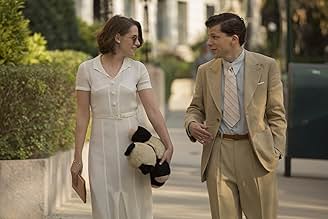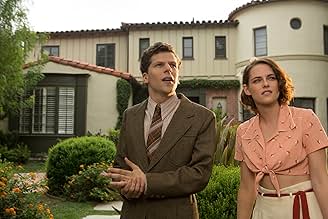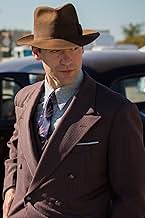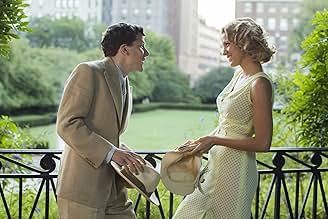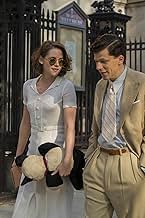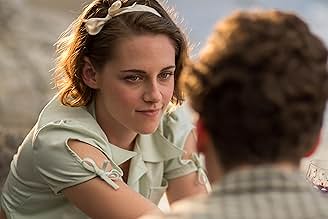IMDb-BEWERTUNG
6,6/10
83.645
IHRE BEWERTUNG
In den Dreißigerjahren geht ein junger Mann aus der Bronx nach Hollywood und verliebt sich dort in eine junge Frau, die regelmäßig einen verheirateten Mann besucht.In den Dreißigerjahren geht ein junger Mann aus der Bronx nach Hollywood und verliebt sich dort in eine junge Frau, die regelmäßig einen verheirateten Mann besucht.In den Dreißigerjahren geht ein junger Mann aus der Bronx nach Hollywood und verliebt sich dort in eine junge Frau, die regelmäßig einen verheirateten Mann besucht.
- Auszeichnungen
- 8 Nominierungen insgesamt
Empfohlene Bewertungen
The plot of the latest Allen's movie is your basic love triangle, set in the 30s and with a small twist. Eisenberg and Stewart play the two young lovers, Bobby and Vonnie, who meet in Hollywood, where Bobby moved from New York.
Bobby's uncle, Phil, is a big shot in the movie industry and Bobby is looking for a job. Vonnie is Phil's secretary and part of her job is to make Bobby feel at home. After a few months, Bobby realizes is not happy on the West Coast, but he is in love with Vonnie.
Bobby proposes to Vonnie and asks her to move to New York with him. But she has a "secret" lover, who also proposes. Bobby moves back to New York alone, to work in his gangster's brother night club. The denouement of their love story is melancholic.
I am not a fan of Stewart, but her part required some aloofness and mystery and she did a good job - whether because she is a good actress or because her range is limited to playing cold and detached I cannot say. Also, the movie offers some classic Allen's punchlines, about life, its meaning or lack thereof. The voice-over did not disturbed me a bit and, as usual, the soundtrack is fabulous. Since I start to feel Allen's nostalgia for the past, this movie fulfilled all my expectations.
If you like Allen's movies, you will probably like this one, too. It is nostalgic but not sentimental and elegant in an old-fashioned way.
Bobby's uncle, Phil, is a big shot in the movie industry and Bobby is looking for a job. Vonnie is Phil's secretary and part of her job is to make Bobby feel at home. After a few months, Bobby realizes is not happy on the West Coast, but he is in love with Vonnie.
Bobby proposes to Vonnie and asks her to move to New York with him. But she has a "secret" lover, who also proposes. Bobby moves back to New York alone, to work in his gangster's brother night club. The denouement of their love story is melancholic.
I am not a fan of Stewart, but her part required some aloofness and mystery and she did a good job - whether because she is a good actress or because her range is limited to playing cold and detached I cannot say. Also, the movie offers some classic Allen's punchlines, about life, its meaning or lack thereof. The voice-over did not disturbed me a bit and, as usual, the soundtrack is fabulous. Since I start to feel Allen's nostalgia for the past, this movie fulfilled all my expectations.
If you like Allen's movies, you will probably like this one, too. It is nostalgic but not sentimental and elegant in an old-fashioned way.
The movie "Café Society" is a romantic comedy-drama and it follows a young man who moves to Hollywood in the 1930s and falls in love with his uncle's assistant. Woody Allen has once again delivered an excellent plot with his signature ingredients: Jewish characters, the mob, family dynamics, infidelity, jazz music, and the glamorous underworld of Hollywood studios and New York bars.
The always-Italian Vittorio Storaro's stunning cinematography brings back the nostalgia of the 1930s. The movie's big surprise is two newcomers at the time: Jesse Eisenberg as Bobby and Kristen Stewart as Vonnie, who manage to convey all the chemistry of lovers in doubt.
The movie has its ups and downs, but it manages to keep the viewer engaged until the end. Allen skillfully avoids falling into the trap of predictable and clichéd endings that are common in other Hollywood movies.
The always-Italian Vittorio Storaro's stunning cinematography brings back the nostalgia of the 1930s. The movie's big surprise is two newcomers at the time: Jesse Eisenberg as Bobby and Kristen Stewart as Vonnie, who manage to convey all the chemistry of lovers in doubt.
The movie has its ups and downs, but it manages to keep the viewer engaged until the end. Allen skillfully avoids falling into the trap of predictable and clichéd endings that are common in other Hollywood movies.
Really nice pic of the thirties.
Beautiful paintings but... something is missing the creepy family deserved more...
They were funny but not important enough it seems
I myself am a sucker for a movie that gives a take on old school Hollywood and Woody Allen did a beautiful job with Cafe Society.
The cinematography on this one did a great job of capturing the feel of 1930s California and New York city. I can't get over how beautiful this thing was shot. A knock out combination of lights setting and music to bring out the mood.
And the jazz numbers that lace this flick did just that for setting that beautiful tone
Jesse Eisenberg started off a little too much Woody Allen at first (one particular scene in the beginning that acts like a hilarious sketch routine, where Jesse's character Bobby buys a hooker). It did get some getting use to, before it became his own thing.
Corey Stoll's character Ben, a though Jew who becomes a night club owner, whole involvement in the film taste like Scorsese light, which only made it even that more interesting.
It's a good Woody Allen comedy,but They are all good to me. If you like one you like them all (but I'm more partial to the ones he does not star in, like this one), and it's super impressive he does one of these on annual basis and he's able keep the quality constant.
It'a funny film with laugh out loud moments, and very crafty narrative narrated by Allen himself. This movie is just another love letter with the city he loves (and a thoughtful P.S you're OK too California), and makes Woody feel like such a helpless romantic, but that's what makes the movie so good to watch.
http://cinemagardens.com/?p=55
The cinematography on this one did a great job of capturing the feel of 1930s California and New York city. I can't get over how beautiful this thing was shot. A knock out combination of lights setting and music to bring out the mood.
And the jazz numbers that lace this flick did just that for setting that beautiful tone
Jesse Eisenberg started off a little too much Woody Allen at first (one particular scene in the beginning that acts like a hilarious sketch routine, where Jesse's character Bobby buys a hooker). It did get some getting use to, before it became his own thing.
Corey Stoll's character Ben, a though Jew who becomes a night club owner, whole involvement in the film taste like Scorsese light, which only made it even that more interesting.
It's a good Woody Allen comedy,but They are all good to me. If you like one you like them all (but I'm more partial to the ones he does not star in, like this one), and it's super impressive he does one of these on annual basis and he's able keep the quality constant.
It'a funny film with laugh out loud moments, and very crafty narrative narrated by Allen himself. This movie is just another love letter with the city he loves (and a thoughtful P.S you're OK too California), and makes Woody feel like such a helpless romantic, but that's what makes the movie so good to watch.
http://cinemagardens.com/?p=55
Set in the 1930s, a young Bronx native moves to Hollywood where he falls in love with the secretary of his powerful uncle, an agent to the stars. after returning to New York he is swept up in the vibrant world of high society nightclub life.
Café Society opened this year Cannes Film Festival and is the latest film directed by Woody Allen. It's a story that mixes various parts of the Allen back catalogue to varying degrees of success. A film that wants more than anything to entertain. In many ways Café Society could be said to restate almost all of the key ideas and themes of Woody Allen's films in one way or another: life, chance, fate, love and guilt.
It also comes from the movie providing the performances. Jesse Eisenberg is so seamlessly cast as the prototypical Allen protagonist that when the film shift from Allen's voice over to Bobby speaking it feels continuous. Bobby's broken heart has caused him to undergo a Bogartian growing up: from a gauche boy to a mature disillusioned man, trapped in the wrong marriage. Moreover, Kristen Stewart sad eyes, throaty delivery and slightly heartbreaking aura make her almost interesting, ad an easy chemistry between her and her third-time co-star Jesse Eisenberg and he fits perfectly into his role while she simply overflows the screen.
But if Café Society is Allen quoting Allen, sometimes literally, at least he's quoting his better bits. Surprise comes from the movie providing the honeyed cinematography by V. Storaro which uses silhouette, graphic compositions and glowing close ups in an often genuinely breathtaking manner. "Life is comedy, but it's one written by a sadistic comedy writer" says Bobby. The comedy writer Allen on display here is more wistful and nostalgic for the very concept of unfulfilled true love, for the heyday of the Hollywood star system, for a New-York of gangsters and back alley craps game and stolen kisses at dawn in Central Park. And all of that nostalgia is okay. Because we were getting pretty nostalgic for the good odd days of warm, witty, fond and funny Woody Allen too.
Make no mistake Café Society is still late-period Allen. Men are described in terms of their characters and complications, while women are still described in terms of their beauty and their effect on said men. When Blake Lively's character motherhood becomes the butt of an exchange between two men, about how women who become mothers devote way too much time to their children (and ultimately not enough to their husband); it's a sour note that reminds us that Bad Allen is always there, underneath.
Overall, this film is Woody Allen's most charming film since Midnight in Paris and maybe most beautiful to look at, maybe ever. It's a little pretty little reminder of what once was
Café Society opened this year Cannes Film Festival and is the latest film directed by Woody Allen. It's a story that mixes various parts of the Allen back catalogue to varying degrees of success. A film that wants more than anything to entertain. In many ways Café Society could be said to restate almost all of the key ideas and themes of Woody Allen's films in one way or another: life, chance, fate, love and guilt.
It also comes from the movie providing the performances. Jesse Eisenberg is so seamlessly cast as the prototypical Allen protagonist that when the film shift from Allen's voice over to Bobby speaking it feels continuous. Bobby's broken heart has caused him to undergo a Bogartian growing up: from a gauche boy to a mature disillusioned man, trapped in the wrong marriage. Moreover, Kristen Stewart sad eyes, throaty delivery and slightly heartbreaking aura make her almost interesting, ad an easy chemistry between her and her third-time co-star Jesse Eisenberg and he fits perfectly into his role while she simply overflows the screen.
But if Café Society is Allen quoting Allen, sometimes literally, at least he's quoting his better bits. Surprise comes from the movie providing the honeyed cinematography by V. Storaro which uses silhouette, graphic compositions and glowing close ups in an often genuinely breathtaking manner. "Life is comedy, but it's one written by a sadistic comedy writer" says Bobby. The comedy writer Allen on display here is more wistful and nostalgic for the very concept of unfulfilled true love, for the heyday of the Hollywood star system, for a New-York of gangsters and back alley craps game and stolen kisses at dawn in Central Park. And all of that nostalgia is okay. Because we were getting pretty nostalgic for the good odd days of warm, witty, fond and funny Woody Allen too.
Make no mistake Café Society is still late-period Allen. Men are described in terms of their characters and complications, while women are still described in terms of their beauty and their effect on said men. When Blake Lively's character motherhood becomes the butt of an exchange between two men, about how women who become mothers devote way too much time to their children (and ultimately not enough to their husband); it's a sour note that reminds us that Bad Allen is always there, underneath.
Overall, this film is Woody Allen's most charming film since Midnight in Paris and maybe most beautiful to look at, maybe ever. It's a little pretty little reminder of what once was
Wusstest du schon
- WissenswertesThis is the first film since Twilight - Biss zum Morgengrauen (2008) that Kristen Stewart had to audition for to win the role.
- PatzerWhen Bobby comes to Phil's house and Phil tells him he is getting a divorce, there is a brief glimpse of the modern-day LA skyline in the upper right hand corner of the screen behind Phil.
- SoundtracksI Didn't Know What Time It Was
Composed by Richard Rodgers & Lorenz Hart
Performed by Benny Goodman and His Orchestra
Courtesy of RCA Records
By arrangement with Sony Music Licensing
Top-Auswahl
Melde dich zum Bewerten an und greife auf die Watchlist für personalisierte Empfehlungen zu.
- How long is Café Society?Powered by Alexa
Details
- Erscheinungsdatum
- Herkunftsland
- Offizielle Standorte
- Sprachen
- Auch bekannt als
- Cafe Society
- Drehorte
- Produktionsfirmen
- Weitere beteiligte Unternehmen bei IMDbPro anzeigen
Box Office
- Budget
- 30.000.000 $ (geschätzt)
- Bruttoertrag in den USA und Kanada
- 11.103.205 $
- Eröffnungswochenende in den USA und in Kanada
- 359.289 $
- 17. Juli 2016
- Weltweiter Bruttoertrag
- 43.763.247 $
- Laufzeit
- 1 Std. 36 Min.(96 min)
- Farbe
- Sound-Mix
- Seitenverhältnis
- 2.00 : 1
Zu dieser Seite beitragen
Bearbeitung vorschlagen oder fehlenden Inhalt hinzufügen







